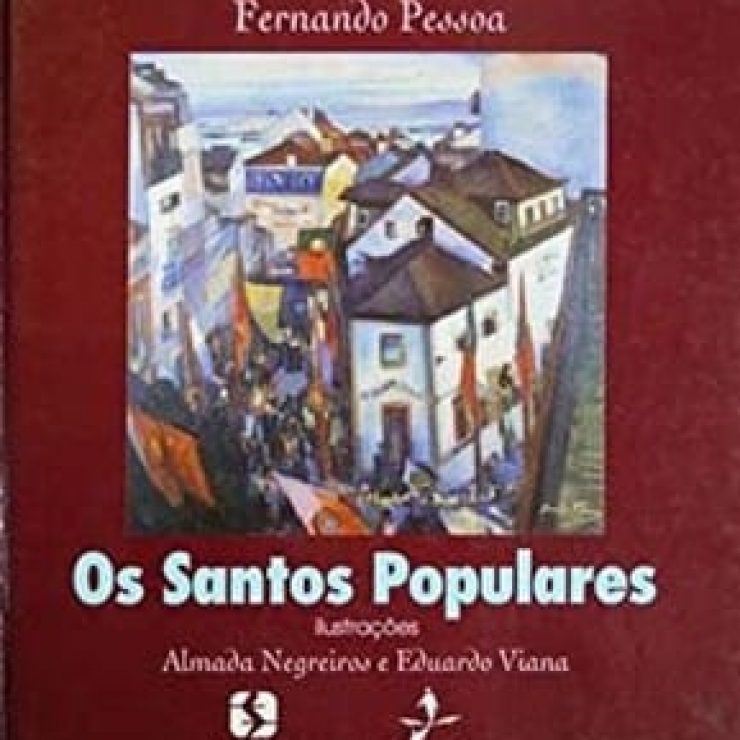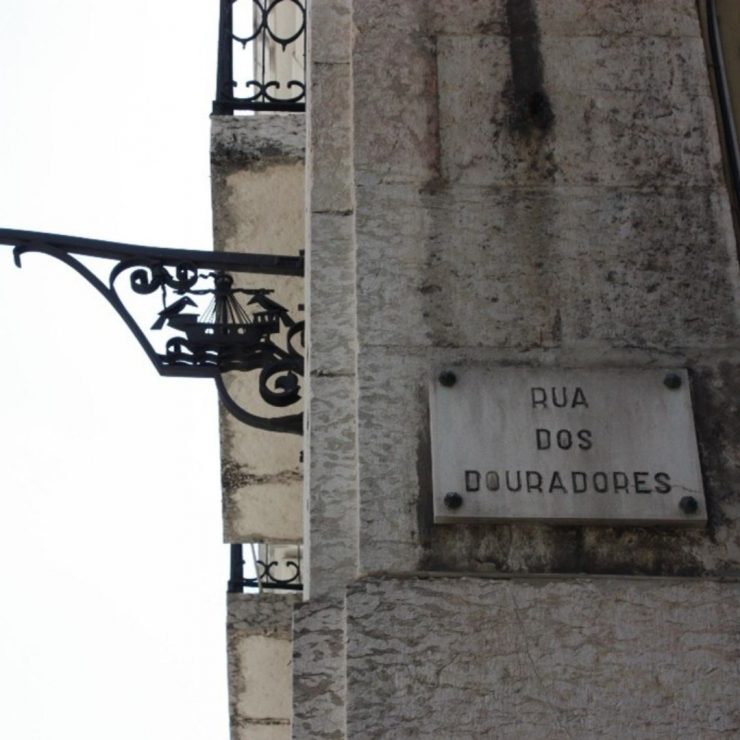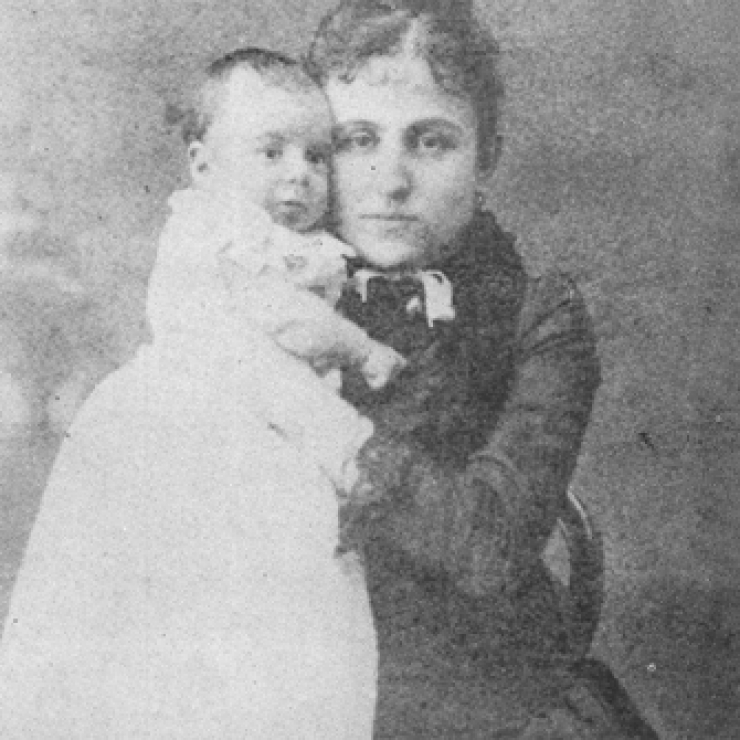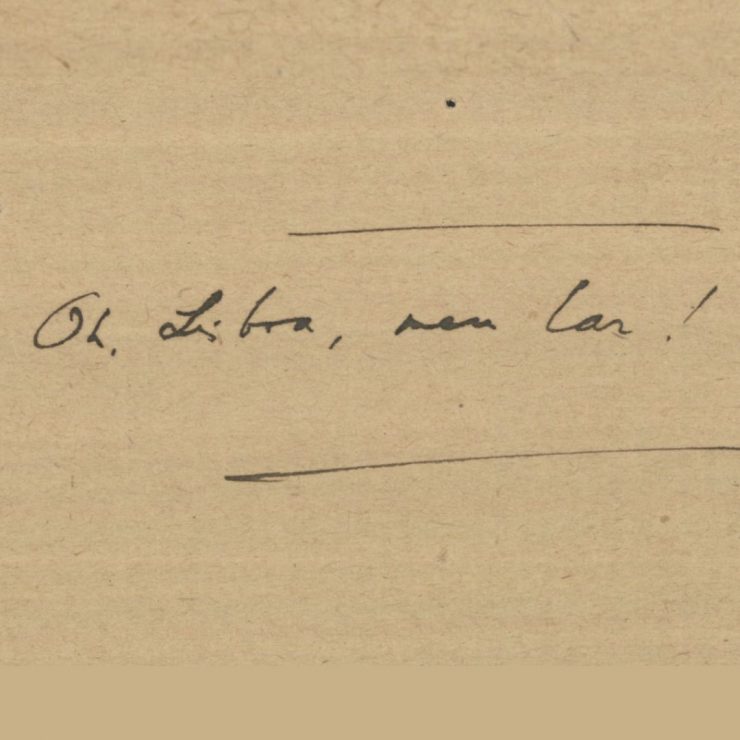Christmas is one of the main Christian festivities and one of the most celebrated festive occasions in the world, even by non-believers. Pessoa obviously embarked on literary forays into this day, so meaningful in the traditions and rites of Humankind. These are scattered, heterogeneous references in which different aspects (literary, philosophical, and religious) of Pessoa’s sensitivity and poetics emerge.
On this regard, it is important to underline that Pessoa, throughout his life, experienced different religious and spiritual phases and sensitivities and ended up identifying with Christianity, but not with any Church. Pessoa’s Christianity was – particularly towards the final years of his life – that of the Gnostics, as he himself claimed in 1928. This is a Christian sect considered heterodox, with alleged connections to the Knights Templar and to mysticism, themes that greatly interested the author of Message.
Moreover, it is important to refer that this selection of texts does not necessarily have to do with Christmas as a religious festivity, but rather as a cultural reoccurrence and imagery, as well as a pretext for reflection on life.
1. Pessoa’s Christmas
Perhaps Pessoa’s best-known poem on Christmas is the one published during his lifetime in Contemporânea, a Modernist magazine, in 1922. Here, Pessoa’s most sceptical side steps forward, as well as a certain boredom and agnosticism, with occultism as a backdrop. This is, evidently, a thought-provocative and “disquieting” poem, which highlights one of the most complex facets of Pessoa’s thinking: the hopelessness of the knowledge seeker in the face of the unfathomable mystery of life.
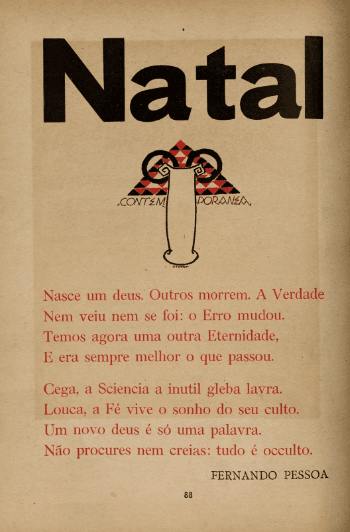
«A God is born. Others die. Truth
Did not come or go. Error changed.
Eternity is different now.
What happened was better always.
Blind, Science plows the useless sod.
Fool, Faith lives the dream of its observance.
A new God is but a word.
Search not, nor believe: all is hidden.»
2. Homesick
Less known to the general public, but also published in Pessoa’s lifetime, we find another poem called “Christmas”, published in 1928 in O Notícias Ilustrado. A poem of longing, in which Pessoa originally deals with the imagery of the home and of the family, often associated with this particular holiday:
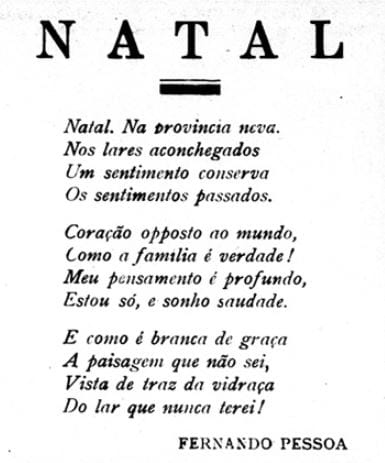
«Christmas… In the countryside, it snows.
In cozy homes,
A feeling preserves
Feelings past.
Heart against the world,
How family is the truth!
My thinking is deep,
I am alone and dream of longing.
And how gracefully white
Is the landscape I do not know,
Looking out the windowpane
Of the home I will never have!”
3. Christmas spent writing
Among the verses that Pessoa dedicated to Christmas, there are also a few that the author produced exactly on the 25th of December, in this case, of 1930. One should be aware that Pessoa attentively and diligently studied the so-called “Historical Jesus” and, on this poem, there is an indirect comment regarding the mentioned date as being “Christmas as convened”, meaning that this was not necessarily the date of the de facto birth of Christ, but rather a convention adopted by Christian communities after the writing of the gospels, possibly around the 4th century AD. Once again, we find Pessoa “disquieting” Christmas…
«It rains. It is Christmas day.
In the North, it is better:
There is the snow, which is bad.
And the cold, which is even worse.
And all are jolly
Because ‘tis the day to be so.
It’s raining on present Christmas.
Better that than snowing.
Since even though this
Is Christmas as convened,
When my body grows cold,
I feel the cold, and not Christmas.
I leave feelings for those who celebrate
And Christmas to who created it,
Because, if I write another strophe,
My feet will freeze.
I want not to be ungrateful
But, under this obscure sky,
The only gift I received
Was simply what the rain gave me.»
4. Birth and Passage
Also written on a 25th December (1918), this is another poem in which Pessoa, which, while not making a direct reference to Christmas, deals, however, with the theme of birth, in a general context of a piece in which the difficult awareness of the passage of time arises, which is settled by the “forgiveness” of the final verse, a theme quite reoccurring in Christianity and universal spirituality. The indirect mention to the Light, using the image of the sun, seems to be yet another reference to Christmas as a holiday that almost coincides with the winter solstice.
«The sun vaguely gilds
The houses, and the hills.
In the city, without horizons,
A sadness looms.
With the shade of the afternoon,
It descends and hurts a little,
Because how late
Is everything that was.
At this hour, more than any other, I mourn
Over what I have lost.
In grey and golden I recall it
And I never saw it.
Unborn happiness,
Grief coming to an end,
Eagerness that only that is
What shall remain —
I whisper without being heard, palm
Of release.
O evening, become night, and may the soul
Have forgiveness.»
5. Christmas in the Book of Disquiet
The final text that we present today, in this succinct Pessoa’s Christmas selection, is not a poem, but rather part of his greatest prose work: The Book of Disquiet. Here, in a section called «More “thoughts”», the author more than focusing on what Christmas represents from a religious or symbolic standpoint, conveys his experience of emotions and images, which empathically connect him to the vast human and spiritual community across all times. Here, we have a sensationist Pessoa of «Feeling everything in every way possible», in a mix between subjectivism and decadentism. Typical elements of The Book of Disquiet.
«Christmas Day. (Humanism. The “reality” of Christmas is subjective. Yes, within my being. The motion: it came, it went. But, for a moment, I lived with the hopes and the emotions of numerous generations, with the dead imaginations of an entire dead lineage of mystics. Christmas in me!)»
To summarize and as we have seen, Pessoa’s Christmas, at least in these texts, is not the conventional Christmas of Churches, but rather a theme and an image that the author approaches in a personal, original and sometimes challenging way. In these writings, there are plenty of opportunities to ponder universal themes of humankind. Essentially, this was possibly Pessoa’s intention by writing – and, in some cases, publishing – these verses and excerpts: to promote reflection, thought and knowledge. Could this be, then, his Christmas gift to us? Could it be the stimulus to be reborn and to revitalize our quest for knowledge and hence challenge ourselves to seek to feel, to imagine and to think more deeply and more inspiringly about life and ourselves?
Fabrizio Boscaglia
_
Discover Lisbon & Pessoa from Lisboa Pessoa Hotel.
_
Some of the texts and references consulted:
PESSOA, Fernando, Poesia 1926-1930, ed. Manuela Parreira da Silva, Ana Maria Freitas, Madalena Dine, Lisboa, Assírio & Alvim, 2005, p. 187.
__, «Natal», O Notícias Ilustrado, 30 dez. 1930, p. 15
__, «Natal», Contemporânea, 6, 1922, p. 88.
Arquivo LdoD (https://ldod.uc.pt/)
Arquivo Pessoa (http://arquivopessoa.net/)

